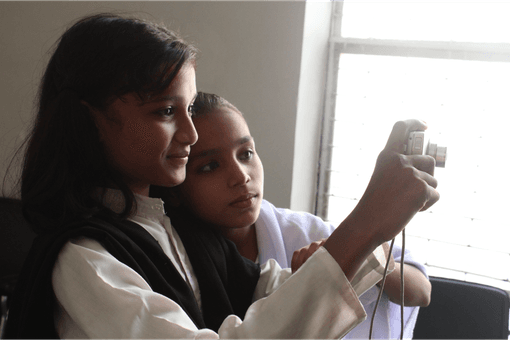Empowering women worldwide with photography
Categories: Technology

Photography was invented here in the UK back in 1830s. There are so many layers to a photograph: the ability to share a story and to evoke emotions; the power to expand the viewer’s field of vision; the universal language it speaks; and most importantly, the ability to create new meanings. 180 years on, photography continues to fascinate us, yet it remains inaccessible to many parts of the developing world. This is particularly true for marginalized women and girls, where socio-economic and cultural barriers prohibit them from using digital tools. 200 million fewer women than men own mobile phones. While travelling in Turkey, four local girls came up to me and asked if I could take photos with them. This got me thinking that photography is a universal language that could transcend barriers for women and girls.
On International Women’s Day in 2013, I set up Lensational. Our aim is to equip marginalized women and girls with photography training and digital skills. I was 20 years old, and I initially set the project up as a Facebook page, but the idea began to evolve. Lensational has transformed into a business so that can empower women across the world in a lasting and sustainable manner.
Amplifying voices with photography
Our starting point is to make sure that the stories of women who might otherwise be voiceless are heard and seen. It is also important to us that these stories are told from the women’s own perspective. We collect used cameras and give them a second life, identifying communities of women and girls that could benefit from expressing themselves with photography. Our mission, however, goes far beyond the relatively short teaching experience. We follow the progress of our students and bring their work to the attention of audiences across the globe.
Women can share their images on our online photo platform, via exhibitions and through our corporate partners, like Getty Images. Half of the revenue then goes to the women as an independent source of income, while the other half is reinvested back into Lensational. helping us to sustain our work. Through photography, these women and girls have a voice, a base of strength and a source of income. In a highly visual and fast-paced world, we want to use the impact of imagery and the power of storytelling to solve one of society’s most pressing challenges – gender inequality.
Addressing inequality
Some recent studies in machine learning and artificial intelligence gave new direction to our goal. Not only did we want to give women a voice, we wanted those voices to challenge gender stereotypes. According to a recent WIRED article, a study that used two well-known image banks highlighted a ‘predictable’ gender bias in their depiction of activities, ‘teaching’ the machines a sexist viewpoint. Images of domestic activities, such as shopping and washing, featured predominantly women, while those showing coaching or shooting featured men. In this case, computers then began to associate people in kitchens with women, even if the subject was male.
Images are visual data that are seen to define what women and men can and cannot do and these perceptions are ingrained onto our minds from a very young age. Whether the problem is trying to get more girls to study STEM or encourage mothers back into work, I believe it stems from the idea that “If you can’t see it, you can’t be it.” With few images of strong, female role models to inspire them, young girls and women may not recognise the options available to them. Our images seek to change that. For each photograph, there are two stories behind it; one within and one in front of the picture. This story continues to evolve each time the photograph is placed in a new context.
As Lensational grows to impact more women and girls, we believe they will be writing human history – or, rather: herstory.




